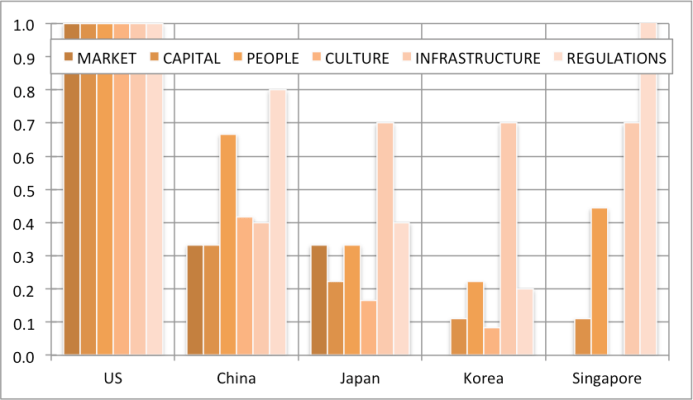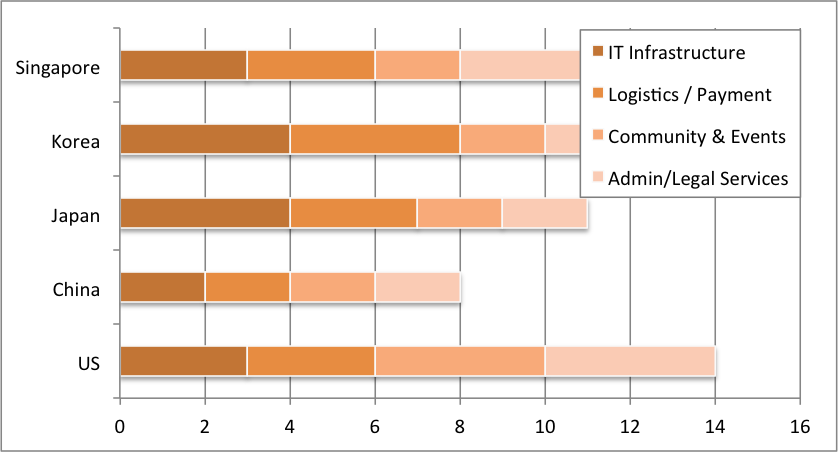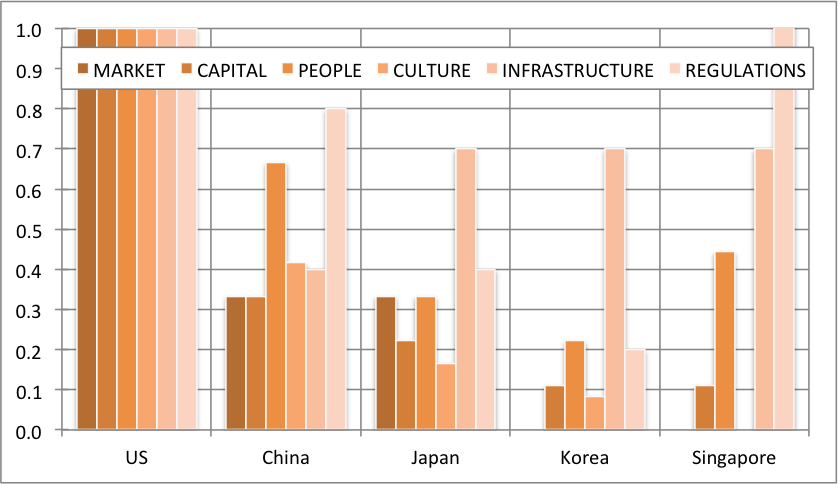Editor’s Note: Benjamin Joffe is the founder of the Asia-focused digital research & strategy consultancy +8* | Plus Eight Star and has been living in Asia (China, Japan, South Korea, Singapore, Malaysia) since 2000. Benjamin has spoken at over 100 conferences (SxSW, TEDx, LeWeb, GamesBeat, etc.) on innovation, Asia, gaming and his keynotes gathered over 250,000 views on Slideshare.
I was a resident mentor at 500 Startups during the last intake and all sorts of interesting visitors come through the door. Among them came journalists from Japan and South Korea who were asking: “Can our country be the next Silicon Valley?”
The topic is not new (see here articles on China, Japan, Japan, South Korea, Singapore, Singapore) and investors are also pretty excited about it (see Sequoia’s latest round).
As I was answering by drawing from my 12 years across Asia (China, Japan, South Korea, Singapore, Malaysia), I had a sort of epiphany and started to write down the criteria I thought composed an ecosystem. I then proceeded to score several markets using those, which brought interesting comparisons. The initial draft expanded into this column. It is far from perfect and comments to improve it are welcome!
ECOSYSTEM CRITERIA
While both the selection of criteria and scoring are highly subjective, they can provide a useful framework and basis for comparison to evaluate other digital ecosystems, and measure their progress.
After listing the various criteria, 6 categories emerged:
- Market
- Capital
- People
- Culture
- Infrastructure
- Regulations
MARKET gives a sense of the market size and its dynamism. A large, growing and rich market is more motivating for entrepreneurs and investors. If a market is growing but not large enough for a tech startup, investors and entrepreneurs might stick to real estate and traditional industries. After trying various criteria, the one that seemed to matter the most was simply GDP, enhanced by access to other markets.
CAPITAL is about the availability of funding at different stages, from angels, VCs, government. Investment also requires potential for exits in the form of IPO or M&As. Without good exit opportunities, entrepreneurs and funding will turn away from the opening of the funnel.
PEOPLE cover the individuals starting, joining and guiding startup companies. Even the most amazing entrepreneur needs a team and guidance. Without support, risk-takers might gradually abandon their pursuits. After a few exchanges and reviews, I decided to add a criterion that might be controversial: English communication skills. While it might not matter for local business, it is massively important for global expansion. There is no arguing that English is today the lingua franca of international business. It is also the language used in Silicon Valley where many technologies and best practices are pioneered.
CULTURE focuses on “Entrepreneurial Culture”. It includes the image and general acceptance of risk and failure. Self-promotion skills and general “hunger” are also included there, as founders are often the first salespeople to investors and clients. Very few countries can rival the US regarding those. Countries with fast growth offer more opportunities, while stable or declining economies tend to favor safe options.
INFRASTRUCTURE refers to networks of people and internet/mobile infra. It also takes into account the infrastructure in terms of logistics / transportation / traffic. This is massively important for e-commerce but also to conduct regular business as it impacts the movement of goods and people. Good infrastructure helps get things done faster.
REGULATIONS are the realm of government action. Ease of incorporation and low cost of compliance help getting started, skilled immigration can balance a limited local talent pool; flexible labor laws make it easier to deal with the uncertainty of startups.
To keep things simple, each criterion was scored from 1 (bad) to 4 (great). Zero would be “non-existent”.
MARKET
Unsurprisingly, the US is leading followed by China and Japan.
Our scale is not linear so Singapore still scores 1 point and Korea 2 despite having economies respectively 13.5 and 58 times smaller than the US. A linear scale would give US: 4, China/Japan: 2, Korea: 0, Singapore: 0
I assumed that Singapore was not a market in itself for a startup based there, and could access larger markets. Several Korean online game companies, for instance, are doing very well in Japan, China and more recently even in the US.
Chris Evdemon, Innovation Works
“One thing to note about China (and maybe to a lesser extent Japan and Korea) is that most start-ups here build products and services for their domestic market whereas Silicon Valley builds for the U.S. + the world (usually a very quick next step) and in Singapore, the few start-ups are forced to build immediately for the region (if not for the world).”
Steven Goh, Mig33
“I think US companies build domestically like for all the other businesses, and the world is of token interest (makes great PR). More than most, but still basically SV-centric.”
CAPITAL
The US tops the chart regarding exits and every investment phase. China comes in second thanks to private money at early stages and wide availability of VC & growth capital. Overall, exit opportunities are much better in the US.
About VC/angel ratios in US vs. China:
Chris Evdemon, Innovation Works
“US / China VC ratio is 4:1 and if you carve out early stage it would be more like 10:1 (estimate). If you look at angels, more like 25:1 so the numbers here do not reflect the size of the gap.”
Singapore has improved its early funding thanks to government support (Eduardo Saverin’s impact has not been reported), though the actual long-term benefit of such support is debated. Singapore still lacks startups and tries to attract entrepreneurs and talent from the region. Several funds with US ties like Golden Gate Ventures and Neoteny Labs have also been set up.
About Asian vs. US presence in Singapore:
Steven Goh, Mig33
“In Singapore, the North Asians (China / Japan) have a greater corporate presence in SE Asia than the SV companies do. They’re not headlining (like Google, Yahoo, Microsoft, Facebook) but DeNA, GREE, Rakuten, Tencent are making more investments in SE Asia than any of the USA majors).”
About acq-hires in Asia:
Steven Goh, Mig33
“There’s ‘acq-hires’ in SV, whereas it’s not noticeable in other markets. Means that if you’re good enough to build a great team in SV, you can still deliver a return to shareholders. Whereas the China / Asian attitude is to let you go broke and to hire the employees.”
PEOPLE
Despite its wide availability of talent, mentors and serial entrepreneurs, the US suffers from its high costs, making it harder for startups that do not have highly skilled, wealthy or connected founders.
About costs increasing in Singapore and Japan:
Chris Evdemon, Innovation Works
“Very true of Singapore too – it has become very expensive for grassroots entrepreneurship to flourish. In Japan as well.”
China turns out to be a rather friendly environment for starting up, with the caveat that this mostly applies to local founders: very few 100% foreign tech entrepreneurs have succeeded in China so far (Fritz Demopoulos, founder of the travel search engine Qunar is a rare case). This is true as well for Japan and Korea (and Russia), mostly due to the prevalence of English in education worldwide over less globalized languages. Linguistic dominance is a consequence of cultural economic influence, itself linked to military power.
While some Silicon Valley kids might be learning Chinese today (ask Dave McClure), we are still far from Mandarin learners to outnumber English ones in third-culture countries… unless Africa switches to Chinese in the coming years adding a billion more calligraphers to the global pool.
The downside is that low starting costs in a large market have made China the most ferociously competitive market in the world. So lower cost, yes, but better be fast and furious.
About English skills: Hiroshi Mikitani, CEO of Japan’s largest e-commerce player Rakuten (who acquired Buy.com, e-reader Kobo and invested $100m in Pinterest’s latest round) decided in 2010 to make English the official language at Rakuten within 2 years and coined the term “Englishnization” for the book he wrote on the topic.
About the advantage of English being the work & industry language:
Chris Evdemon, Innovation Works
“Silicon Valley can attract the best talent from all over the world (and will continue to do so) largely because everyone can communicate, it is also the same language used by their industry. This advantage will be very difficult to emulate.”
About English in Japan:
Hiroshi Mikitani, CEO of Rakuten
“The lack of English communication skills prevented Japan from being a global leader. We really need to wake up and open up our eyes.”
About equity culture:
Steven Goh, Mig33
“I would add ‘equity culture’: people knowing how to value themselves regarding equity. There’s a strong equity culture in the USA, virtually none in Singapore.”
About the advantage of SV due to reinvestment by successful entrepreneurs:
Chris Evdemon, Innovation Works
“One criterion that matters is RECIRCULATION: successful entrepreneurs who put their know-how and capital back into the ecosystem repeatedly after they exit their ventures. No one has achieved this except Silicon Valley (for several generations now).”
About mentors and angels in China:
Chris Evdemon, Innovation Works
“In China we are at the first such generation (top executives at Baidu, Alibaba, Tencent, etc.). They are in their early 40s at most and still at the helm. It’s only in the past 3-4 years that the first batch started leaving and contributing back to the ecosystem.”
CULTURE
“Entrepreneurial Culture” is probably the most lacking when considering Japan, Korea and Singapore. A lack of role models in the media to inspire entrepreneurs and overall risk-aversion are holding back the development of entrepreneurial types.
One might remember the media treatment in Japan of the CEO of Internet portal Livedoor Takafumi Horie, which alone might have downgraded the image of tech entrepreneurs by 1 or 2 notches.
About risk-taking in Japan:
Masaru Ikeda, Startup Dating
“Japan’s risk-taking attitude used be low but there is now a boom encouraging people to start their own business.”
About speed of business:
Steven Goh, Mig33
“I would include ‘speed of contract’: the way that people and resources come together and come apart on projects.”
INFRASTRUCTURE
While the US enjoys the best community of people and strong legal/admin service providers, connecting people and computers is pretty good in both Japan and Singapore. Unfortunately, having the world’s fastest Internet in Korea is not enough to compensate for a general lack of grassroots support.
I spent quite a bit of time in Malaysia and heard that so far there are more event organizers than startups there. It’s a first step!
REGULATIONS
This category is the only one where the US is not an overall winner, mostly due to immigration policies. Singapore shines with startup-friendly regulations. China scores fairly well overall.
OVERALL RATING
This rating is done using the average score of each country for each criterion. This is rather imperfect, as obviously, the “GDP” criterion within MARKET should probably be weighted differently to reflect its actual importance.
While scores might not look dramatically different, gaining one whole point implies changes that might take years to happen.
USA
CHINA
JAPAN
KOREA
SINGAPORE
If we remove the baseline and count US as the reference, the differences become striking:
Some takeaway ideas
a. The US and Silicon Valley are but one of many possible digital ecosystems. While they enjoy many strong points, they are not perfect notably due to talent costs and immigration policies.
b. China is the second strongest ecosystem thanks to its market size, access to capital, entrepreneurial spirit and talent.
c. Japan and Singapore, despite their large difference in scale, are somewhat comparable in terms of environment. Singapore leads in most things regulatory.
d. While Korea is improving rapidly, it is still bogged down by its limited access to capital.
e. Japan, Korea and Singapore are afflicted by their lack of experienced entrepreneurs, role models, poor acceptance of failure and risk-aversion.
The only criterion not easily fixable within a few years is GDP. The example of Singapore showed that capital, people, infrastructure and regulations could all be improved fairly rapidly. What is missing is stronger entrepreneurial culture!
IN CONCLUSION
There is more to ecosystems than Silicon Valley.
No ecosystem in the world is perfect: if there is a lot of capital, talent gets expensive.
If the market is large, the market becomes very competitive.
While entrepreneurs are born everywhere, they will not be nurtured and thrive without the right ecosystem, which might require them to relocate to better latitudes.
So far, Silicon Valley proved the most nurturing if you can enter the country and afford to live there, but it is by no means the only place where entrepreneurs can succeed.
I believe this opens two interesting possibilities:
– Creating local ecosystem champions. China, Japan, Korea but also Russia and Brazil have strong enough ecosystems to support the emergence of local giants. Just to name a few: Tencent, Alibaba, Baidu, Sina, in China; DeNA, GREE and Rakuten in Japan; Nexon, NHN in Korea; Mail.ru, Yandex in Russia are all dominating their local market. In some cases, foreign investors succeed there too: the discreet MIH (South Africa) and DST (Russia) have fared particularly well in emerging markets.
– Creating global companies or “micro-multinationals” from anywhere. Skype was made in Estonia, Spotify in Sweden, Angry Birds in Finland and UberStrike in China (#1 free-to-play first-person shooter on Facebook and Mac App Store with over 6 million registered players. Note: I am a founding partner of Cmune, makers of UberStrike).
I hope this article will help understand ecosystems in a more granular manner, and lead governments, community organizers, investors and of course entrepreneurs to realize that ecosystems are built from the combined efforts of all.
The flaws in this column are numerous and comments are very welcome, as well as input regarding other. Score your own country or city!
Additional comments
About ecosystem dynamics:
Steven Goh, Mig33
“How the ecosystem comes together matters: from heuristics over returns to multiple connections, like Sequoia’s claim to have funded 40% of Nasdaq companies: can you imagine Youtube getting the exit it did if it didn’t have Mike Moritz on the board of both Youtube and Google?”
About parallels between tech and other industries:
Steven Goh, Mig33
“Industry concentrations are not unique to tech: Oil / Gas in Houston, Mining in Perth (Australia) / Vancouver / South Africa, Textiles / Electronics / Manufacturing around Guangzhou / Milan, etc. Comparatively, these industries look and smell like Silicon Valley by way of dynamism, money / returns, way the labor markets move, etc.”
About the author: Benjamin Joffe is the founder of the Asia-focused digital research & strategy consultancy +8* | Plus Eight Star and has been living in Asia (China, Japan, South Korea, Singapore, Malaysia) since 2000. Benjamin has spoken at over 100 conferences (SxSW, TEDx, LeWeb, GamesBeat, etc.) on innovation, Asia, gaming and his keynotes gathered over 250,000 views on Slideshare. He is also an angel investor in global startups, half of them from Asia. Most recently Benjamin was a resident mentor at 500 Startups. He can be reached at benjamin [at] plus8star.com and on twitter at @benjaminjoffe.
Chang Kim, CEO of Tapas Media (for Korea), Steven Goh, CEO of Mig33 (for Singapore), Chris Evdemon, Partner at Innovation Works (for China) and Masaru Ikeda, Co-Founder of Startup Dating (for Japan) contributed to this article.













